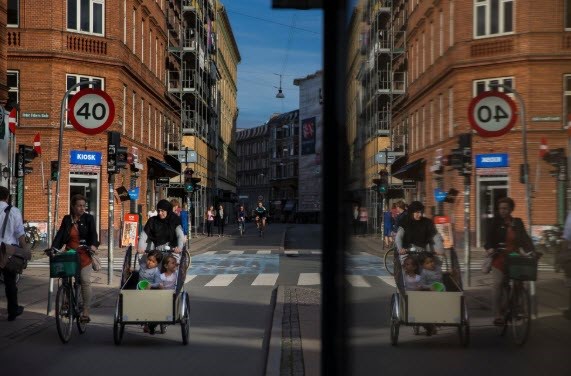
Friday December 21, 2018
By Martin Selsoe Sorensen

Some Muslim and Jewish groups prohibit or discourage touching members of the opposite sex outside the immediate family.CreditCreditIlvy Njiokiktjien for The New York Times
COPENHAGEN — Denmark will require anyone who takes Danish citizenship to shake hands at the naturalization ceremony, under a law passed on Thursday, which lawmakers say is aimed at Muslims who refuse on religious grounds to touch members of the opposite sex.
The law has prompted strong reactions from some of the mayors who must conduct such ceremonies, and who are upset that they will become the faces and fists of a policy they call awkward, “purely symbolic” and irrelevant to an applicant’s qualifications. They say the Danish Parliament, which approved the measure, has artificially elevated a social custom to a national value.
But Denmark is not alone. Authorities in Switzerland and France have recently cited “lack of assimilation” in rejection of citizenship to foreigners who refuse to shake hands with officials.
“If you arrive in Denmark, where it’s custom to shake hands when you greet, if you don’t do it it’s disrespectful,” said Martin Henriksen, a lawmaker who has been critical of Islam and is the right-wing Danish People’s Party’s spokesman on immigration. “If one can’t do something that simple and straightforward, there’s no reason to become a Danish citizen.”
He said the law, which will take effect on Jan. 1, was required because of “Muslim immigration to Denmark over a long time,” and added that he hoped it would be followed by a ban on Muslim women wearing veils at citizenship ceremonies.
The country’s integration minister, Inger Stojberg, declined an interview, but wrote on her Facebook page that a handshake was a “visible sign that you’ve taken Denmark to heart.”
Some Muslim and Jewish groups prohibit or discourage their faithful from touching members of the opposite sex outside their immediate families.
The handshake requirement, which includes a provision that the wearing of gloves is unacceptable, is the latest in a series of Danish anti-immigrant measures that critics say are symbolically charged but serve little purpose. The government recently announced plans to isolate certain migrants it wants to deport on a small, out-of-the-way island, and Parliament approved funding for the project on Thursday.
This summer, the Parliament prohibited the wearing of face veils in public, although researchers say only about 200 Muslim women follow the practice in Denmark. In 2015, the country sharply cut social programs for asylum seekers, and a law passed in 2016 allows the authorities to confiscate migrants’ valuables to help cover the cost of their stays in Denmark.
The handshake requirement will deter few applicants for citizenship, officials said, but it sends a harsh message to Muslims, and many mayors who conduct citizenship ceremonies said they would find ways to avoid it.
“It’s against my ideology and conviction to have to force other people to have body contact,” said Thomas Andresen, the mayor of Aabenraa, near the border with Germany.
To circumvent the law, Mr. Andresen said, he could either arrange to have local officials of both genders take part in the ceremonies or have state officials take over. Either way, he said, he would look for pragmatic solutions while protesting legislation “gone too far.”
Mogens Jespersen, the mayor of Mariagerfjord, a northern town, told the national broadcaster that he would disregard the law and accept a nod or a bow from an applicant refusing to extend her hand.
“But I think it’s a hypothetical question I’ll never face,” he said.
In Ishoj, a suburb of Copenhagen, immigrants and their descendants constitute 40 percent of the population. But its mayor of 17 years, Ole Bjorstorp, said he had never met anybody who refused to shake his hand.
If it were to happen, he said, he would just find somebody else to perform the ceremony.
“My conscience doesn’t allow me to report people on this basis so they won’t become Danish citizens,” he said. “It’s a moral and ethical issue.”
One mayor said he had met a female asylum seeker who declined to shake his hand for religious reasons, but he did not find it disturbing.
“I was in no doubt that she meant to show the exact same respect in her way as I did in mine,” said Soren Steen Andersen, mayor of Assens, on Funen Island, just off the Danish mainland.
The handshake ceremonies, he said, were “awkward” and a “mistaken way” to show that people belonged in Denmark.
Billy O’Shea, an Irish translator living in Denmark since 1981, is waiting for an answer to his application for citizenship, but said he would give it up if he were forced to shake hands.
“Respect is not something you in a democratic country, can demand by threats,” he wrote in an email exchange. “Respect is something that occurs between equal citizens. We can’t shake each other’s hands if one of us are on our knees.”
To achieve citizenship in Denmark, an immigrant must have legal residence for up to nine years, pass a Danish language test, have no record of serious crime, be financially self-sufficient, and pass a test on Danish politics, history and society.
Ms. Stojberg, the immigration minister, who is a member of the center-right Venstre party, told Parliament that municipalities would face fines if they did not abide by the handshake law.
A spokesman for The Council of Appeal, the body that oversees local government compliance with laws, said that the mere threat of a fine usually made municipalities comply, and that decades had passed without one being fined.
In Aabenraa, Mayor Andresen said he regretted Danes’ negativity about immigration, noting that the country had successfully integrated refugees from the former Yugoslavia, and had built close ties to Germany, a former enemy.
“I’d be sad to see us portrayed as a xenophobic country and a xenophobic people. Because we absolutely are not,” he said. “And we need the work force.”